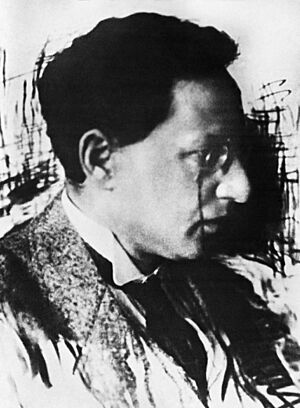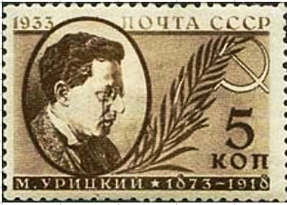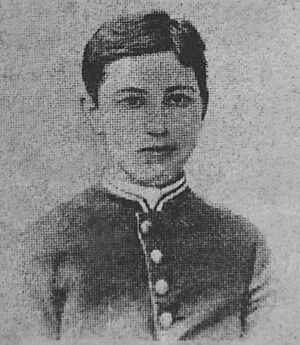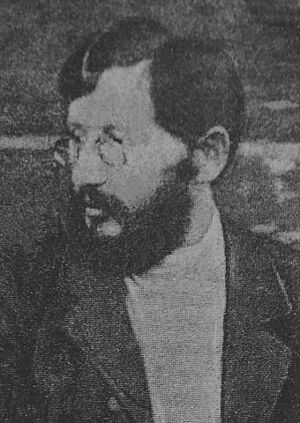Moisei Uritsky facts for kids
Quick facts for kids
Moisei Uritsky
|
|
|---|---|
| Моисей Урицкий | |

Moisei Solomonovich Uritsky
|
|
| Chief of Cheka of Petrograd city | |
| In office March 10, 1918 – August 30, 1918 |
|
| Preceded by | Position created |
| Succeeded by | Gleb Bokii |
| People's Commissar of the North Commune | |
| Personal details | |
| Born | January 2, 1873 Cherkasy, Kiev Governorate, Russian Empire |
| Died | August 30, 1918 (aged 45) Petrograd, Russian SFSR |
| Political party | RSDLP (1898–1903) Mensheviks (1903–1917) RCP (1917–1918) |
| Alma mater | St. Vladimir Imperial University of Kiev (1897) |
| Occupation | Chekist, political activist, and politician |
| Profession | Lawyer |
Moisei Solomonovich Uritsky (Ukrainian: Мойсей Соломонович Урицький; Russian: Моисей Соломонович Урицкий; January 14, 1873 – August 30, 1918) was an important leader in the Bolshevik political party in Russia. After the October Revolution in 1917, he became the head of the Cheka secret police in the city of Petrograd. Uritsky was killed by a young military student named Leonid Kannegisser. This event led to a period of harsh actions by the Bolsheviks.
Contents
Early Life and Education
Moisei Uritsky was born on January 14, 1873, in Cherkasy, a city in what was then the Russian Empire. His family was Jewish. Sadly, his father, who was a merchant, died when Moisei was very young. His mother raised him by herself.
He went to a school called the Bila Tserkva Gymnasium. To support himself while studying, he worked as a teacher. During this time, he became interested in social ideas and joined a group called the social democrats.
Joining the Revolution
Moisei Uritsky studied law at the St. Vladimir Imperial University of Kiev. While he was a student, he joined the Russian Social Democratic Labour Party. He helped create a secret network to bring in and share political books and papers that were not allowed by the government.
In 1897, he was arrested for running a secret printing press and was sent away from his home. He became deeply involved in the revolutionary movement. He also joined a Jewish workers' group called the Bund. In 1903, he became a member of the Mensheviks, another group within the Social Democratic Party.
Uritsky's Role in the 1905 Revolution
Uritsky was very active in the Russian Revolution of 1905 in St. Petersburg. Because of his actions, he was exiled a second time. He worked with another revolutionary, Alexander Parvus, to send secret agents to gather information from the government's security groups.
Role in the Russian Revolution
In 1914, Uritsky moved to France and wrote for a party newspaper. He returned to Russia after the February Revolution of 1917. He joined a group called the Mezhraiontsy. A few months before the October Revolution, he joined the Bolsheviks. In July 1917, he was chosen to be part of their Central Committee.
Uritsky played a key role in the Bolsheviks taking power by force in October 1917. After this, he was made the head of the Petrograd Cheka secret police. In this job, Uritsky was in charge of finding and dealing with people who were against the Bolsheviks. This included rich people, military officers, other socialist groups, and church leaders.
Treaty of Brest-Litovsk and Civil War
Uritsky did not agree with Lenin's decision to sign the Treaty of Brest-Litovsk in 1918. This treaty ended Russia's part in World War I. Because he disagreed, Uritsky resigned from his position, along with other leaders like Nikolai Bukharin.
However, when the Russian Civil War began on May 25, 1918, Uritsky returned to his role on the Central Committee. The Civil War was a fight between the Bolsheviks and many different groups who opposed them.
Assassination and Its Impact
On August 30, 1918, Moisei Uritsky was killed by Leonid Kannegisser. Kannegisser was a young military student. He shot Uritsky outside the Petrograd Cheka headquarters. He did this because his friend and other officers had been executed.
This assassination, along with an attempt to kill Lenin on the same day, led the Bolsheviks to start a period of severe actions known as the Red Terror. During this time, many people who were seen as enemies of the Bolsheviks were arrested or killed.
For many years, Palace Square in Petrograd was known as Uritsky Square, from 1918 to 1944. Even today, there are still many streets in Russia named after him.
Images for kids
See also
 In Spanish: Moiséi Uritski para niños
In Spanish: Moiséi Uritski para niños
 | Emma Amos |
 | Edward Mitchell Bannister |
 | Larry D. Alexander |
 | Ernie Barnes |





